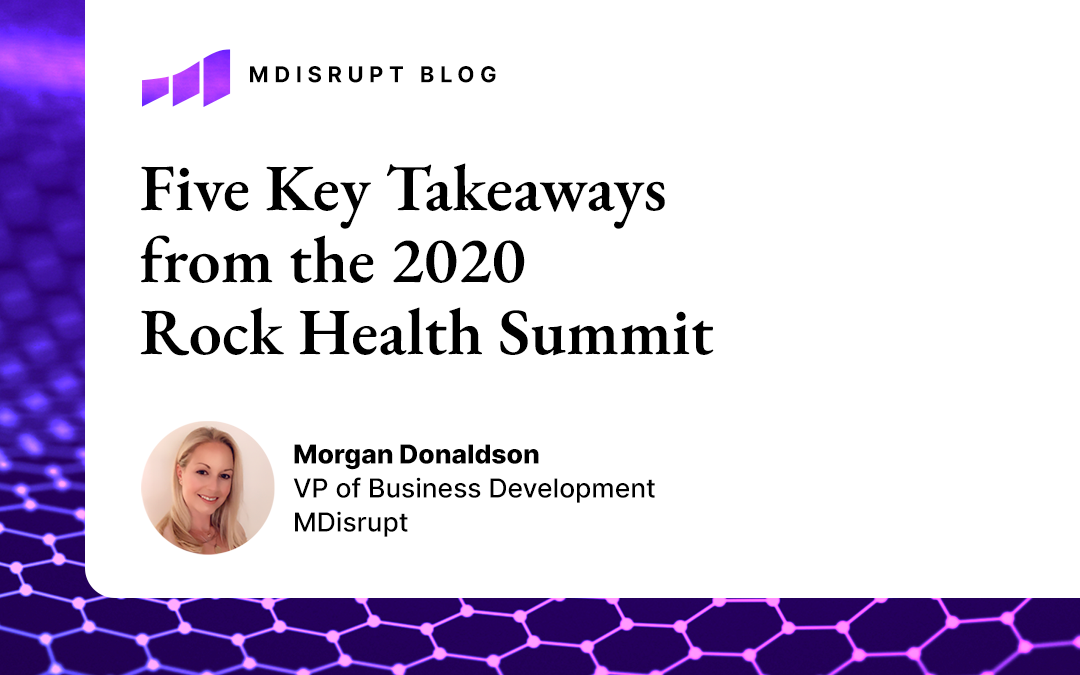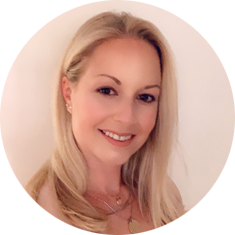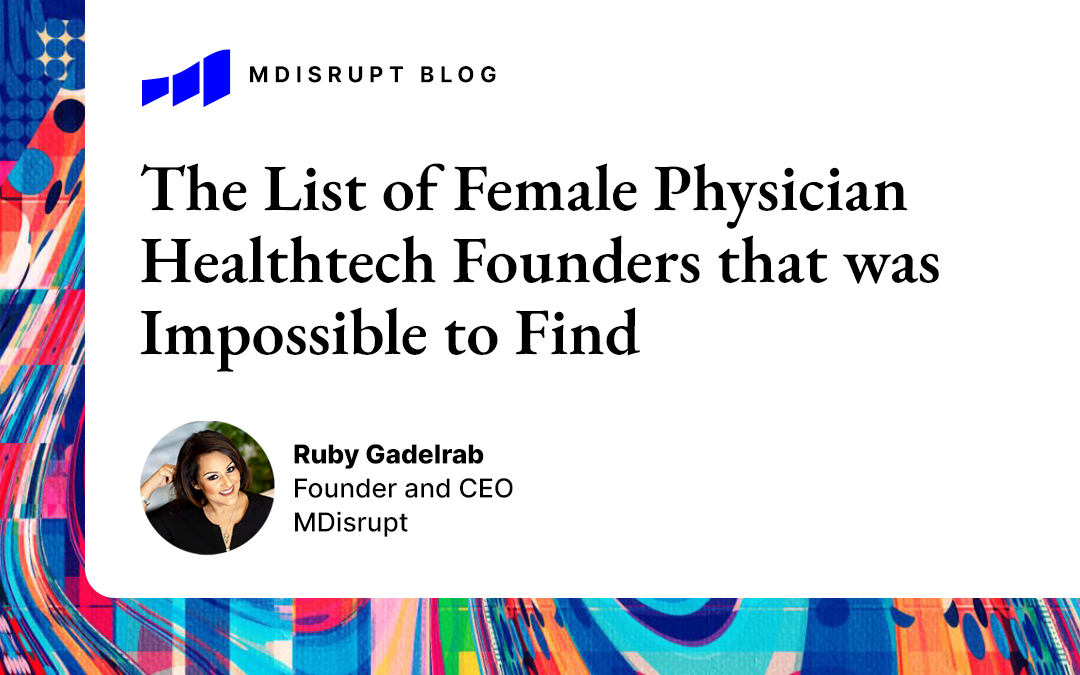
5 Key Takeaways from the 2020 Rock Health Summit
This past week, our team attended the 9th annual Rock Health Summit, a two-day digital health conference well worth attending for all stakeholders in the healthtech industry. As the first venture fund dedicated to early-stage digital health companies, Rock Health convened a really diverse set of speakers: from policy makers, to leaders in technology and medicine. With the summit taking place in virtual form this year, Rock Health did not disappoint in keeping the panelists and the Slack discussions engaging for attendees. Here are just some of the key takeaways from the event.
COVID-19: a crisis of opportunity
Several panelists commented that the current COVID pandemic has unfortunately highlighted just how severe the health inequity crisis is in the US. Abner Mason of ConsejoSano shared that COVID-19 has not been the great equalizer—on the contrary, it has been the “great revealer” that our healthcare system isn’t working equally for everyone. Furthermore, Secretary Eric Hargan of HHS highlighted that the pandemic has also revealed trust issues with respect to the development of safe and effective coronavirus vaccine.
While the COVID-19 pandemic has highlighted health disparities, it has also rapidly accelerated the adoption of some digital health technologies, particularly telehealth.Many participants expressed optimism that digital health and telemedicine innovations can create a more accessible and equitable healthcare delivery system across the country. In fact, Aneesh Chopra, president of Care Journey, highlighted that 10M Medicare beneficiaries have had at least one telehealth consult, and one-third of frail elderly patients have accessed some form of telehealth during the COVID-19 pandemic. He went on to say that the top-performing accountable care organizations in the country have had ~50% of patients engaged in telehealth during the COVID crisis. There is no doubt that the pandemic has accelerated the adoption of telehealth: from just 11% of US consumers in 2019 to well over 46% during the COVID crisis, presenting a tremendous opportunity for the implementation of novel remote patient monitoring applications.
Telehealth will persist long after the COVID crisis
While the pandemic spurred widespread adoption of telemedicine by necessity, many panelists commented that they believe it will persist far into the post-COVID era. With one third of Americans not having a primary care physician (PCP), Hill Ferguson (CEO, Doctor on Demand) says there is every reason to believe that telemedicine can address this need by offering virtual PCP consults, particularly for high-risk patients. Some speakers underlined the need for clear and consistent reimbursement rates as foundational to the broad adoption of telemedicine, particularly with the increased focus on value-based care. Another emerging dynamic is the interplay between brick-and-mortar and telehealth providers: Some predict an uptick in enabling “application access” between providers and patients, among physicians, and between providers and payers, in order to provide seamless care coordination for telehealth patients.
When it comes to vulnerable patient populations, trust is foundational
Abner Mason, CEO of ConsejoSano said it best: We have an enormous trust deficit in our healthcare system, and to treat everyone the same is to say “You don’t matter.” Vulnerable patient populations have different concerns, constraints and needs. When it comes to developing digital tech for these patient populations, “REAL (race, ethnicity and language) data is necessary but not sufficient: Companies must understand patient cultures. Mason says some health plans are finally investing in getting to know their patient populations but they have to do more—including collecting more social determinants of health (SDOH) data—because they are in a unique position to lead and drive change to care delivery models. Chris Klomp (CEO, Collective Medical) reminded us that we should be thinking “digital first, but not digital alone.” A logically-tuned IT infrastructure, he said, is one that is anticipatory and allows humans to do what technology can’t: Engage with other humans and build trust.
“Hire and Wire”: the key to creating racial diversity in digital health
One summit highlight was the panel on racial diversity in which Rock Health presented some key findings from their survey data, including:
- Only white respondents felt that digital health has become more inclusive. Black and other minority respondents felt it has stayed the same, and 17% of Black founders felt it had gotten worse.
- White and Asian founders are more likely to be backed by venture investment, while Black founders are more likely to bootstrap. This is a pretty important finding given that sustainable scale tends to be highly dependent on VC backing,
A discussion that followed highlighted the disparity in funding available to minority versus white entrepreneurs. André Blackman (CEO, Onboard Health) said that the solution is building a diverse team and a diverse board. Tech companies need to be building teams that represent the consumers or patients they are building for. With Silicon Valley’s bias for white male founders (it’s estimated that 77% of VC backed founders are white), this was a particularly important topic for Rock Health to address. While many acknowledged the efforts of organizations like the American Medical Association and Peloton for making strides to address racial inequity, Sydney Thomas (Sr. Associate, Precursor Ventures) said she would like to see more capital going into minority-founded companies and, further, she would like to see white and Asian founders and investors acknowledge the disparity and actively work to build bridges across all races.
There were two additional highlights from this session: The first from Ulili Onovakpuri, a partner at Kapor Capital, who pointed out that investors invest only when they can relate to the problem. Therefore, they are constantly investing in companies and founders that solve problems for the “top of the pyramid.” And yet the bottom of the pyramid is infinitely bigger, with larger market sizes (better for investors) that need different, lower cost solutions. Investors need to think differently and humble themselves to learn.
The second highlight came from Derrick Reyes, founder of Queerly Health. Reyes’ advice to the healthtech industry was HIRE or WIRE: Create opportunities to HIRE people from more diverse backgrounds or WIRE:write the check and invest in them.
Investment dollars are still flowing, despite the pandemic
When Silicon Valley Bank published its mid-year Healthcare Investments & Exits Report 2020, it was surprising to most that venture fundraising in healthcare had reached $10.4B in the first half of 2020, nearly matching the 2019 full-year record. In a pandemic?? Yes, says Julie Yoo (General Partner at Andreessen-Horowitz), who went on to say that deal flow increased even more radically in Q3, with YTD deal volume up 22% over the third quarter of 2019. In fact, an increase in new investors is making the rounds more competitive. A Rock Health report earlier this year showed that $5.4B was invested in the digital health space, in the first half of 2020 in the US alone, despite the pandemic—providing optimism for the space despite a difficult year,
Thank you to the Rock Health team for bringing together such wonderful panelists and for drawing our attention, if even virtually, to some difficult but necessary topics.
1. McKinsey COVID-19 Consumer Survey, April 27th 2020

Morgan Donaldson, VP of Business Development, MDisrupt
Morgan Donaldson is a business development executive with more than 15 years of experience bringing genomics technologies and molecular diagnostics to global markets (EMEA, LATAM, APAC, North America). She has developed international sales channels, managed business development teams, led product developments, led contract negotiations with Fortune 500s and participated in due diligence assessments. She has led the international growth strategy for several genomics startups in the Bay Area and in Canada.
If you are healthtech company who is trying to develop and scale a health product and need access to industry leading health experts, talk to us—we can help.



